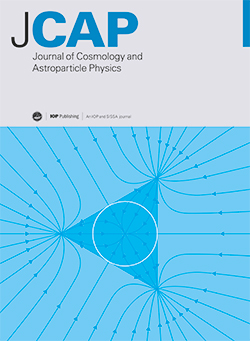用 JWST 探测到再电离前的星际莱曼-α 晕
IF 5.3
2区 物理与天体物理
Q1 ASTRONOMY & ASTROPHYSICS
Journal of Cosmology and Astroparticle Physics
Pub Date : 2024-10-16
DOI:10.1088/1475-7516/2024/10/059
引用次数: 0
摘要
詹姆斯-韦伯太空望远镜(JWST)最近报告了大量高红移(z > 10)的紫外发光星系,以及z ∼ 11的莱曼-α发射(LAE)星系。我们利用观测到的紫外发光度以及较低红移下的数据驱动方法,对前再电离和再电离时代(z ∼ 9-16)以 Loeb-Rybicki 光环形式散射的星系间莱曼-α 强度的可观测性进行了约束。我们预测了探测这些星系际光环所需的灵敏度和分辨率,发现在 z ∼ 9 时,LAE 光度大于 1043 ergs/s 的单个光环可以在几个西格玛的水平上被探测到,而将 ∼ 10 个光环堆叠起来,预计可以探测到 z ∼ 16 的光环。发现这些光环有望揭示宇宙再电离期间星系间的中性氢。本文章由计算机程序翻译,如有差异,请以英文原文为准。
Intergalactic Lyman-α haloes before reionization are detectable with JWST
The James Webb Space Telescope (JWST) recently reported a large population of UV luminous galaxies at high redshifts, z > 10, as well as Lyman-α emitting (LAE) galaxies out to z ∼ 11. We use the observed UV luminosities along with a data-driven approach at lower redshifts to place constraints on the observability of the intergalactic Lyman-α intensity, scattered in the form of Loeb-Rybicki haloes, during the pre-reionization and reionization epochs (z ∼ 9-16). We forecast the sensitivity and resolution required to detect these intergalactic haloes, finding that individual haloes with LAE luminosities > 1043 ergs/s are detectable at a few sigma level at z ≲ 9, while stacking of ∼ 10 haloes is expected to result in detections out to z ∼ 16. Finding these haloes is expected to shed light on the neutral intergalactic hydrogen during cosmic reionization.
求助全文
通过发布文献求助,成功后即可免费获取论文全文。
去求助
来源期刊

Journal of Cosmology and Astroparticle Physics
地学天文-天文与天体物理
CiteScore
10.20
自引率
23.40%
发文量
632
审稿时长
1 months
期刊介绍:
Journal of Cosmology and Astroparticle Physics (JCAP) encompasses theoretical, observational and experimental areas as well as computation and simulation. The journal covers the latest developments in the theory of all fundamental interactions and their cosmological implications (e.g. M-theory and cosmology, brane cosmology). JCAP''s coverage also includes topics such as formation, dynamics and clustering of galaxies, pre-galactic star formation, x-ray astronomy, radio astronomy, gravitational lensing, active galactic nuclei, intergalactic and interstellar matter.
 求助内容:
求助内容: 应助结果提醒方式:
应助结果提醒方式:


